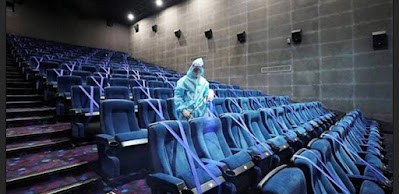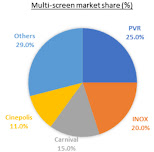Multiplex Business : Walking A Tight Rope
India is a country of cinemas. It produces almost more than 2000 movies each year in various languages. Indian cinema is a global enterprise. However, currently it is going through an evolution where the movie industry is shifting from the single screen movie theatres to multiplex. Research has shown that from the 1970s cinemas were no longer attracting proper audience. During the 1980s the general middle class people were not at all seen in the theatres they preferred only those halls which were within their colonies. This downshifting trend of the movie industry which continued for almost two decades had led to the appearance of multiplex, which could provide a suitable environment for theatrical experience of the middle class people.
The arrival of multiplex changed the way of watching movies. Now it has better sound, picture quality, seating arrangement, availability of good snacks and beverages, also the convenience of shopping in case of shopping mall multiplexes. Blooming of multiplex started during the 1990s in India. PVR was the first multiplex chain of India. Currently cinema chains like INOX, Carnival Cinemas, PVR, SPI Cinemas, Cinepolis and Big Cinemas are operating across the country. Mayajaal in Chennai is the largest multiplex in India with 16 screen megaplex and PVR is the largest multiplex chain in India.
First you need to understand in, what ways a movie theatre can make money,then
you will understand betteron how much money theatre owner makes.
Following are the revenue models for theatre owners.
- Revenue from ticket sales.
- Advertisements
- Snacks
- Parking (if it is a single theatre)
1)Revenue from tickets:
This totally depends on whether theatre owner is acting as exhibitor or distributor.If theatre owner is acting as exhibitor, following are the percentage in which theatre owner makes money.
Multiplex theatre's charges as follows.
Week 1: 50:50(Theatre owner : distributor)
Week 2: 60:40
Week 3 : 70:30
Later -- same as week 3.
Single screens charges as follows:
(25:75) (Theatre owner:distributor)If theatre owner acts as distributor, all the box office collections goes to theatre it self and that revenue would be split with producers, subject to the terms with producer.
2)Advertisements :
In advertisement there are lot of categories, like display ads, trailers, lounge ads, etc.
Based on the size and no of days of the campaign, theatre owner charges and the pricing is totally depend on the no of foot falls particular theatre gets.
3)Snacks.
This is where theatre owners makes lot of money, according to one of my friend who works in one of the famous theatre chain, theatre owner makes a profit close to 70% popcorn they sell and on an average of 50% on all the snacks they sell.
So we Indians have habit of buying snacks during their visit to cinemas,so snacks section is where they make lot of profit.
4) Parking :
This is again depends on whether it is single screen or multiplex location, if a multiplex is located all by it self separately in a location then parking charges goes to them directly.
So, now you can calculate the math on amount of money a theatre owner make based on the above mentioned models.
|
Per seat calculation | |||||||||
|
With a margin of 63 %before taxation the industry before the pandemic was growing at 20% CAGR |
Supporting Industries;
|
Malls with Inox( in lacs) |
|
|
Footfall avg in a month |
286 |
|
Average Screens |
475 |
|
Footfalls per screen per annum |
120421 |
|
Footfall per 4 screens |
4,81,686 |
|
Assumed spend on other items(30%) |
1,44,506 |
|
Average spend |
500 |
|
Spend induced by multiplex per annum(lacs) |
722 |
Ticket booking Co has shown an impressive rise both in revenue in last ten years resulting in not only ease of watching movie but also has created a lot of jobs .
Life After Pandemic:
The consumer who had a habit of watching a movie every month realised the cost of watching and the hassle whic he had to undergo on Indian roads the below box clearly indicates that to watch a movie one has to spend close to Rs 1250 but has to drive through traffic and also spends more than 4 hours to watch a 2.15 hours of content than also spends close to Rs 1000-2000 on stuff which he never aspired for.
|
Time spent |
Time in minutes |
|
Commute to a multiplex |
25 |
|
Parking |
15 |
|
Before movie |
60 |
|
Way back Home |
25 |
|
Total Time spent |
250 |
We are seeing history repeating itself the way Postal department gave way to emails and messaging applications we also see how mobile telephony took over the pager industry similarly we are seeing the OTT taking over the multiplex industry and its gobbling it at a pace which was never seen before. Am presenting a scenario which clearly shows if the Eps is reduced from Rs 39-10 the share price will be hammered the company will have no other option but to shut down in next 2-3 years or the other scenario will see only 2 player market operating in a very limited geographical area.
|
PVR |
|
|
Share Price |
1430 |
|
EPS |
39 |
|
P/E |
37 |
|
Expected EPS |
10-15 |
|
Share Value Expected |
370-550 |
The OTT Saga:
Over-the-top (OTT) media service providers also known as video streaming giants like Amazon Prime, Netflix, Hotstar, Disney plus, Zee5, etc. have captured the entertainment market with their luring schemes.
However, the question arrives if lockdown will change our entertainment choices forever or we pick on relaxing with popcorns and web-series/web-movies or still prefer dressing up and paying for popcorns and movies to enjoy the ambience of multiplexes and cinema halls?
During the lockdown, there was a 265 percent increase in OTT traffic since February last week — in spite of the drop from HD to SD.The major OTT players not only are now releasing every new movie but also are giving customer a taste of series and international series which he was never aware of , also with availability of 4K quality Televisions available at an affordable price, the customer is consuming not only movies but also high quality content.In near future the OTT will rise and will do a serious damage to multiplex and will render them bankrupt and will also displace the satellite television.







Comments
Post a Comment